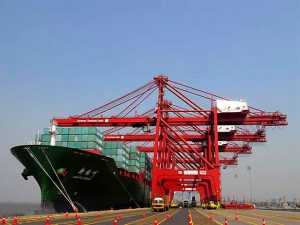To know how Covid-19 pandemic has impacted different sectors and industries in India, www.lifeandmore.in invited experienced professionals from different fields to talk us through the challenges ahead as also offer solutions and suggestions to emerge victorious from the present state of affairs. Read all this and more in THE PERFECT VIEW
SANJAM SAHI GUPTA
The maritime sector, always slow to adapt technology, is now forced to adopt it under the fast forward mode. At the same time, the contribution of the human element can’t be ignored — the commitment of the men and women who continue to move the world, even under this global crisis.
The trade has been severely impacted, the charter rates are down and the supply chains have been disrupted. After a disastrous 2019, the shipping industry would have definitely looked forward to a better year instead its navigating unchartered waters.
The World Trade Organisation (WTO) predicts that the world trade is expected to fall by between 13% and 32% in the year 2020. Our industry, which moves international trade enabling 90% of world trade at roughly USD 12 trillion, is facing large scale disruptions.

While the current global pandemic has exposed the fragility of the global supply chains, at the same time, the importance of shipping and the logistics chain has never been more visible. The industry hopes governments across the world will formulate policies to support shipping, ports and logistics operations. Whether or not seafarers are officially designated “key workers”, the shipping industry knows that they are, just like port workers and truck/ trailer drivers, or shore staff working from home.
The long-term impact of coronavirus on shipping sector will be innovative ideas and digital disruptions for the better. This would mean the need to retool, retrain and reskill our people for the challenges of tomorrow or rather the new realities of tomorrow. I wouldn’t call it the “new normal” because there’s nothing normal about the place we are in.
Freight technologies will attract investment but the value addition would be by companies providing data analysis, artificial intelligence software and overall end-to-end supply chain management ie enable better tracking, monitoring, facilitation, integration and information sharing.
The health crisis might see progress in different segments of robotics and freight technology. This data analysis will connect the different stakeholders and players of the maritime industry to optimise operations and industry resilience; an accelerated push for growth in autonomous transportation paving the way for a cheaper, more efficient and resilient industry.
The maritime industry has always been resilient, has overcome many challenges and market falls. However, the current pandemic is one which proves that there will be a survival of the fittest or those most adaptable to change.
The pandemic has pressed the fast forward button on the use of remote technologies, digitisation and the trend towards increased use of automation. The only silver lining is that the pandemic took place at a time where the internet kept us connected virtually. Smart working, virtual connectivity and communication have never been so valuable.
Sanjam is Director, Sitara Shipping, a key Indian player in the Offshore Dedicated Centre and Project Cargo Market